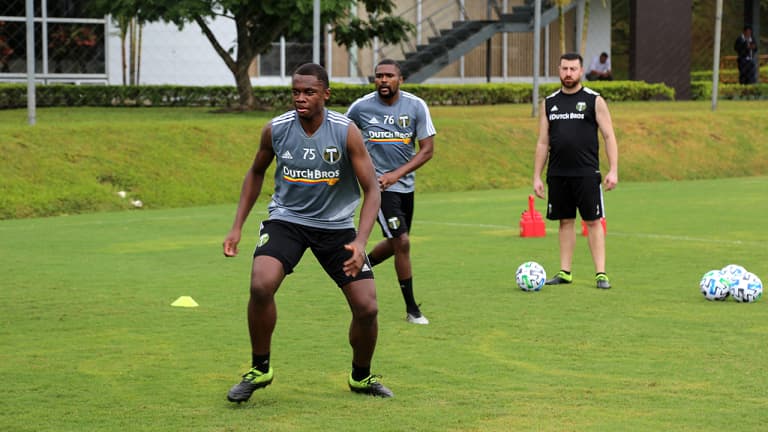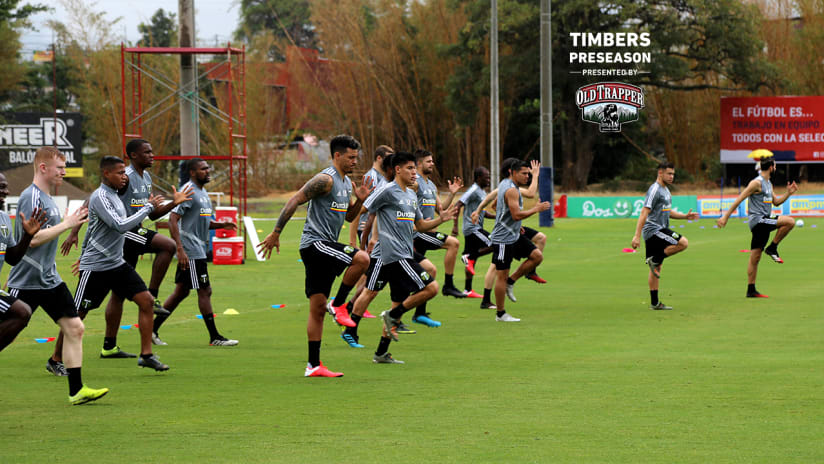SAN JOSÉ, Costa Rica – There are mountains encircling the complex at Proyecto Gol – the facility the Portland Timbers train at throughout their time in Costa Rica – mountains that would be spared the description, but those who define ranges by their mounts. San José’s may not carry the same novelty they did a year ago, when Portland arrived for their first preseason in Central America, but within the players’ ranks, there’s still space to feed something new, even if part of the team’s neophyte ranks were here a year before.
That part is in Ryan Sierakowski, the Timbers 2 forward who, one year after coming to San José as the Timbers’ first-round draft pick in 2019, is back for a second spell in Costa Rica. He’d been in the country before his time with the Timbers, making a trip for a tournament as a youth player, but the same can not be said for the seven other non-first team players who head coach Giovanni Savarese has invited for this two-week spell.
Their ranks include Marcus Epps and Ken Krolicki, professionals with enough experience to bolster the fortunates in Hillsboro, where T2 begins playing, this season. They include Jake Leeker, who is held in high regard by the Timbers’ technical staff after a first season at T2. They include Chris Duvall, a trialist with the MLS team who is competing to bolster the squad’s defensive corps, and they include Aaron Molloy, the 2020 first-round draft pick out of Penn State whose instincts and distribution proved so convincing in midfield over the first week of preseason.
Perhaps most tellingly for hardcore Timbers fans, the Costa Rica corps also include two prospects yet to graduate from the team’s Academy. Among the veterans, primed professionals, and youthful aspirants wearing green in San José, goalkeeper Hunter Sulte and striker Tega Ikoba are the youngest.
“Now, we have the right channels,” head coach Giovanni Savarese says, after the team’s first day of training at Costa Rica’s national team center. The topic, as we settle into the third question of our interview, is Sulte and Ikoba, but the point quickly something greater. It’s about the process that brought those two to Costa Rica.
“Now, we have people who are looking at every match, and they’re recommending players,” Savarese continues. “Now, we have also, Dyson … “ referencing an Academy player, Dyson Clapier, who impressed in his late-season debut with T2. “ [He] was with us last week [in Portland], and he did well. But then we didn’t need him to come here. He got a taste of what he needed to have. Tega is the one that has been able to make the next step.”
The “need” to come to Costa Rica came down to the state of the Savarese’s squad, one blessed options in central defense, midfield, and on the wings, but temporarily in need at other areas. Fullback, specifically on the right, is one, as is forward, where the Timbers have been connected with a pair of potential signings.
Goalkeeper, too, is short a number while Jeff Attinella progresses in his recovery from shoulder surgery. While his progress continues in Portland, another goalkeeper, Sulte, is needed in Costa Rica.
That type of reasoning, though, reflects a short-term viewpoint. The long-term concern is how to continue integrating the Academy into the first-team plans. The inclusion of two prospects on the travel roster was one indication of progress, but in a way, the omission of others was, too.
“The good thing is for the other [players] to be thinking: It should have been me,” Savarese says, explaining why other Academy prospects were not included in the travel squad. “Why wasn’t it me? I’m going to push harder, because I want to be the next guy. I feel like this wasn’t the guy to be there. When you create that competition, you make sure guys want to be here. And they perform better, because they’re being looked upon every match by the right people, who are giving us the information.”
Savarese has made it a point to get to as many T2 matches as possible, making almost every home kickoff that doesn’t conflict with first-team commitments. Likewise, he or his staff are regular presences at Academy events, reinforcing a pipeline the Timbers have tried to solidify as their academy has evolved.
“This is the way a good club operates,” Savarese says, bluntly, supplying his own bottom line. “To make sure that we work from the top down.”
Sulte and Ikoba, though, cover only one part of the non-first team, traveling squad. And not even the largest one. The largest is comprised by Sierakowski, whose first year at T2 compelled a second year with Portland. It’s comprised by Leeker, who impressed beyond injuries during his Rose City debut; and Epps, whose versatility along the right flank could prove valuable for Timbers 2 head coach Cameron Knowles; along with Krolicki, whose signing after MLS time with the Montreal Impact is seen, internally, as a boon.
“For us, it’s important for them to have this part of their development,” Savarese said, opening his thoughts on the club’s USL players. “Specifically with T2, it’s important, first, to bring these players into [Costa Rica]. Having them here, they help make up the numbers, but they also are making training more competitive, which will be good for them when they go back to T2.
“And we brought certain positions that we felt will be important for us also with the first team in case of any situation, like any [situation] in U.S. Open Cup, so that they also start being part of the [MLS] group.”
The two non-MLS players who don’t fall into any group, and thus make a group for themselves, are Duvall and Molloy, two players on drastically different trajectories. Mollory, 23, was a standout last fall at Penn State University, but he has yet to experience professional soccer. In the meantime, Duvall, 28, has been a professional since leaving Wake Forest after his senior year in 2013.

Tega Ikoba and Chris Duvall train with the Timbers in Costa Rica (Richard Farley / Portland Timbers)
“He’s a player that has experience, a player that has done well in MLS,” Savarese said of Duvall. “We are assessing him. We have more players that are going to come, that we can assess, at that position, as well.”
Molloy’s profile is obviously different. Whereas Duvall has established a professional portfolio that spans six seasons, Molloy is a relative blank canvas, leaving his future open to uncertainties. Those uncertainties, though, allow upsides, and down, to remain in view.
“I hope that he stays with us in T2, because he is definitely someone that can add something important,” Savarese said, of Molloy. “His work ethic is great. His mentality is great. His thirst to learn is fantastic. And he is pushing everyone around him, to show that he belongs.”
Amid a roster that’s returned so many figureheads – that has elected to augment, with players like Yimmi Chara and Dario Zuparic, instead of displace – the non-MLS players may stand out. But as with most training squads throughout the league, there is method behind the inclusions, one that can lead to two Academy players, four USLers, a draftee and an invitee earning a flight to Costa Rica.












